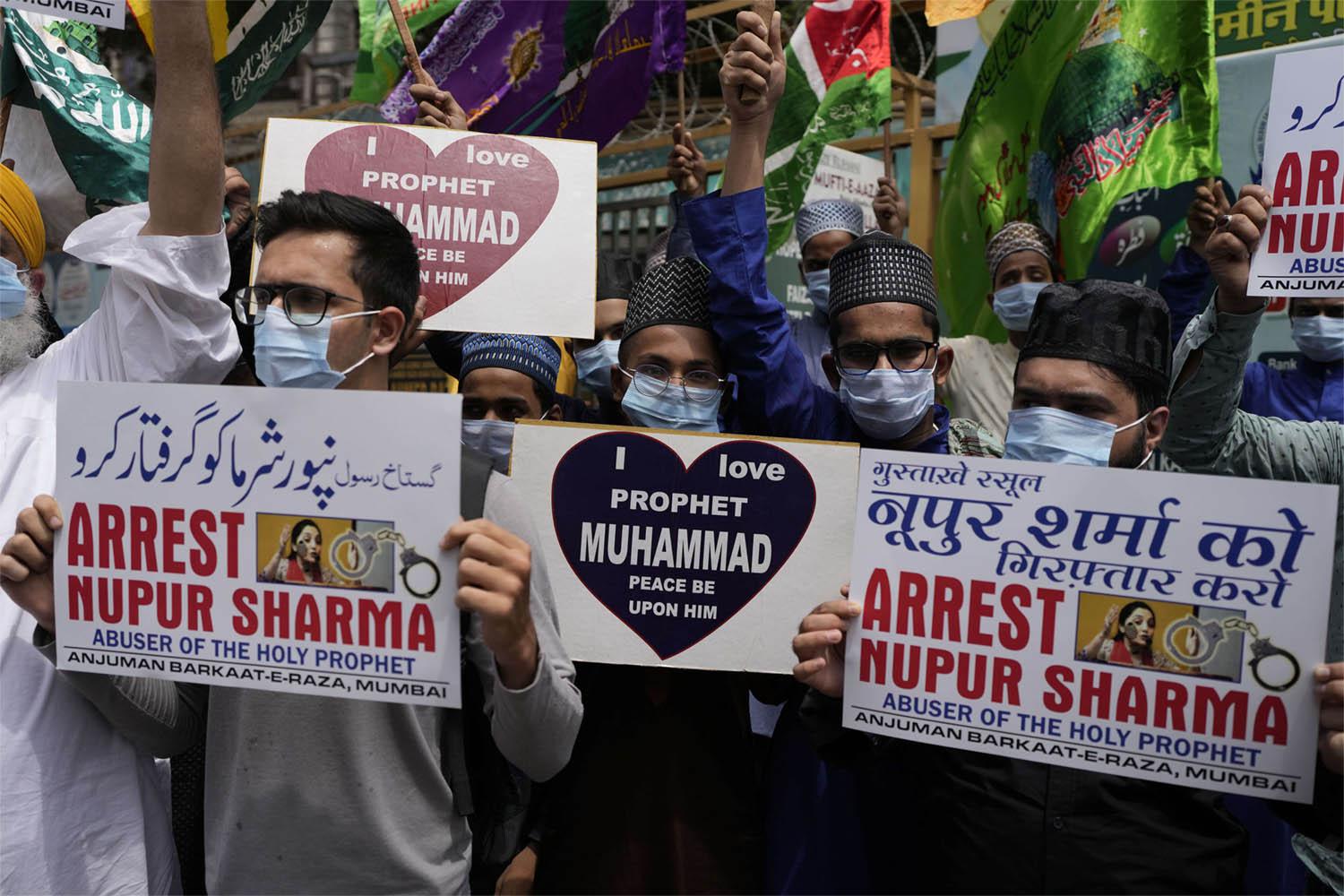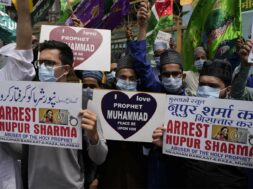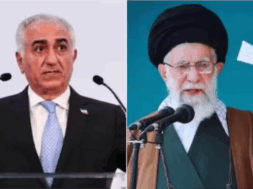
Protest against India Grows in Islamic Countries over Remarks on Prophet Mohammad
Manas Dasgupta
NEW DELHI, June 6: A Kuwaiti supermarket pulled Indian products from its shelves even as Iran became the latest Middle Eastern country to summon the Indian ambassador as a row grew on Monday over former BJP official’s alleged derogatory remarks against Prophet Mohammed. The workers at the Al-Ardiya Co-Operative Society store piled Indian tea and other products into trolleys in a protest against comments denounced as “Islamophobic.”
Outrage in the Muslim countries against India continued unabated. Even as the BJP suspended its spokesperson Nupur Sharma and expelled another leader Naveen Kumar Jindal over their blasphemous remarks, the global outrage over the controversy refused to die down demonstrating that the actions taken against the guilty leaders were “too little and too late.” After Qatar and Kuwait, Saudi Arabia, Afghanistan, Pakistan, and Bahrain have reacted to the comments by the leaders.
Even as the Indian government on Monday fought to defuse anger in Gulf countries and opposition attacks at home over comments on Prophet Muhammad, Saudi Arabia, Qatar and other countries in the region, as well as the influential Al-Azhar University in Cairo, have condemned the remarks. At the supermarket just outside Kuwait City, sacks of rice and shelves of spices and chilies were covered with plastic sheets. Printed signs in Arabic read: “We have removed Indian products.” “We, as a Kuwaiti Muslim people, do not accept insulting the Prophet,” Nasser Al-Mutairi, CEO of the store, said. An official at the chain said a company-wide boycott was being considered.
The BJP on Sunday suspended Ms Sharma for expressing “views contrary to the party’s position” and said it “respects all religions.” Ms Sharma said on Twitter that her comments had been in response to “insults” made against the Hindu god Shiva. “If my words have caused discomfort or hurt religious feelings of anyone whatsoever, I hereby unconditionally withdraw my statement,” she said.
On Sunday, Qatar demanded that India apologise for the “Islamophobic” comments, as Vice-President Venkaiah Naidu visited the gas-rich Gulf state in a bid to bolster trade. Iran followed Qatar and Kuwait by summoning the Indian ambassador to protest in the name of “the government and the people.” Al-Azhar University, one of Islam’s most important institutions, said the comments were “the real terrorism” and “could plunge the entire world into deadly crisis and wars.”
The Saudi-based Muslim World League said the remarks could “incite hatred”, while Saudi Arabia’s General Presidency of the Affairs of the Grand Mosque and the Prophet’s Mosque called them a “heinous act.” In a tweet, the Foreign Ministry of Saudi Arabia said “The Ministry of Foreign Affairs expresses its condemnation and denunciation of the statements made by the spokeswoman of the #Indian Bharatiya Janata Party [#BJP], insulting the Prophet Muhammad peace be upon him.” The Ministry has further welcomed the action taken by the government.
The Bahrain foreign ministry has stressed the need for denouncing attempts to provoke religious feelings and incite religious hatred. Bahrain has also welcomed the government’s decision to suspend its spokesperson over the “insulting” comments. The Taliban regime in Afghanistan has condemned comments by the spokesperson of the government and has urged the “Indian government not to allow such fanatics to insult the holy religion of Islam and provoke the feelings of Muslims.”
The row follows anger across the Muslim world in 2020 after French President Emmanuel Macron defended the right of a satirical magazine to publish caricatures of the Prophet Mohammed. French teacher Samuel Paty was beheaded in October 2020 by a Chechen refugee after showing the cartoons to his class in a lesson on free speech. Images of the Prophet are strictly forbidden in Islam. In further criticism of the Nupur Sharma, the Gulf Cooperation Council, an umbrella group for the six Gulf countries, “condemned, rejected and denounced” her comments. Bahrain also welcomed the BJP’s decision to suspend Ms Sharma over “provocation to Muslims’ feelings and incitement to religious hatred.”
Gulf countries are a major destination for India’s overseas workers, accounting for 8.7 million out of a worldwide total of 13.5 million, foreign ministry figures show. They are also big importers of produce from India and elsewhere, with Kuwait importing 95 percent of its food according to the trade minister. Kuwaiti media have reported that the government asked New Delhi for an exemption from India’s surprise ban on wheat exports over food security and inflation worries.
On the government’s part, top officials tried to manage the diplomatic fallout as nations including Qatar, Saudi Arabia, Oman, the UAE and Iran demanded an apology from the government for allowing the derogatory remarks. On Sunday, envoys in the Gulf were summoned amid widespread calls on social media for a boycott of Indian goods in the Gulf. The foreign ministry said in a statement the offensive tweets and comments did not, in any way, reflect the views of the government.
In Qatar, Ambassador Deepak Mittal said the comments “do not, in any manner, reflect the views of the Government of India. These are the views of fringe elements.” A senior official at the Qatar Embassy in New Delhi said Modi’s government must publicly distance itself from the comments. “Hurting our religious sentiments can directly impact economic ties,” media reported the official as saying.
Pakistan Foreign Ministry has summoned Indian Charge D’ Affaires to protest comments by BJP leaders, and has called the disciplinary action taken against them “perfunctory.” India, however, slammed Pakistan for criticising it. External Affairs Ministry spokesperson Arindam Bagchi said the “absurdity of a serial violator of minority rights commenting on the treatment of minorities in another nation is not lost on anyone.” “The world has been witness to the systemic persecution of minorities including Hindus, Sikhs, Christians and Ahmadiyyas by Pakistan,” he said.
“The Government of India accords the highest respect to all religions. This is quite unlike Pakistan where fanatics are eulogized and monuments built in their honour,” Bagchi said. “We call on Pakistan to focus on the safety, security and well-being of its minority communities instead of engaging in alarmist propaganda and attempting to foment communal disharmony in India,” he said.
The BJP suspended spokesperson Nupur Sharma and expelled another leader, Naveen Jindal, over the controversial comments. The comments were made by Nupur Sharma during a TV debate last week in the backdrop of a series of communal incidents across the country. BJP media chief Naveen Jindal posted a tweet about the Prophet, which he later deleted. In a statement on Sunday, the BJP said it is “strongly against any ideology which insults or demeans any sect or religion” and “does not promote such people or philosophy.”
India’s trade with the Gulf Cooperation Council (GCC), which includes Kuwait, Qatar, Saudi Arabia, Bahrain, Oman and the UAE, stood around $90 billion in 2020-21. Millions of Indians live and work in GCC countries. Prime Minister Narendra Modi in recent years has strengthened economic ties with the energy-rich nations, the top source for country’s fuel imports.
The actions taken against the guilty BJP leaders not only failed to impress the international community, but it has also raised questions on the sincerity of the ruling party and the government of India in condemnable remarks. The long gap of nine days between the remarks made on the television channels and the action taken against the offenders, and that too when the Muslim countries, and more particularly the Gulf countries, reacted adversely, showed that neither the party nor the government really regretted the remarks but were forced to take disciplinary actions against them only to appease the Islamic nations.
It has also created churning within the BJP. “On our internal groups she [Ms. Sharma] has received a lot of sympathy and many are questioning whether to support a party that is so pusillanimous in helping out supporters, even terming the official spokesperson of the party as ‘fringe’,” a young social media right-wing influencer said. The top leadership of the party and the government, which has only received accolades from such groups till now, has been roundly criticised for the first time.
Some office-bearers of the party acknowledged the nine-day interval between Ms. Sharma’s remarks and her suspension and only after demonstrations in the Islamic countries showed the party in a bad light. “Basically that, till it became an international issue, we were not going to take any action. This depicts insincerity with regard to the reasons behind the suspension and that we can be steam-rolled,” a senior office bearer of the party said.
The former Finance Minister and senior Congress leader P Chidambaram pointed out that it was not domestic criticism but international backlash that had pushed the BJP to take action against the two functionaries. “Domestic criticism did not impel the BJP to act against the two spokespersons. It was only the international backlash that pushed the BJP to take action,” he said. He also remarked that Sharma and Jindal were not original creators of Islamophobia. “Mrs Nupur Sharma and Mr Naveen Kumar were not the original creators of the Islamophobia. Remember, they were trying to be more loyal than the king,” Chidambaram tweeted.
Meanwhile, the Delhi Police has registered a case on a complaint by Nupur Sharma in which she has alleged that she is receiving death threats over her remark on Prophet Muhammad. The case has been registered against unidentified people.
Ms Sharma yesterday posted an apology on Twitter, saying that it was not her intention to hurt anyone’s religious sentiments. She also said she was worried about her family’s security and urged people not to make her address public — the BJP’s letter to her, which was widely circulated on social media, had her address.













